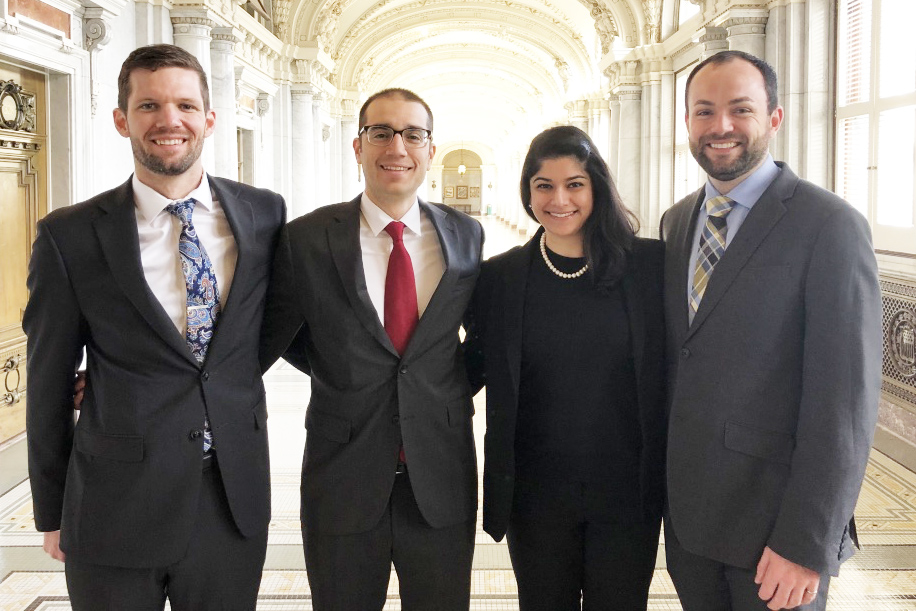In April, four 3Ls became the latest in a high-performing cohort of BC Law students to forcibly argue before the Ninth Circuit Court of Appeals (NCAP) over the past six years.
Joe Noreña ’19, Tyler Quesnel ’19, Hadiya Deshmukh ’19, and Sean Patrick McGinley ’19 presented oral argument as part of the Court’s law school clinic program. This year’s group argued two cases on behalf of lawful permanent residents who have been ordered deported.
On the first case, “Joe and Tyler were incredible advocates for our client,” said Kari Hong, founder and director of the Boston College Ninth Circuit Appellate Program. “Joe was facing tough and difficult questions from judges but was masterful in providing them with the cases and factual information they needed to decide critical legal issues. After recognizing that the Court seemed inclined to agree with our arguments, Tyler exercised incredible discipline and judgment to end the case on a short rebuttal, highlighting the key legal issues that our client needs to prevail.”
The client, Mr. Y-V-, is a lawful permanent resident who got his green card at age seven and lived in the US for thirty-five years before his deportation. His brothers and sisters all live here. This offense was his only arrest and conviction. When the client traveled to Mexico for a family emergency, upon his return, Customs and Border Patrol discovered this offense and started immigration proceedings. He was in immigration detention for a couple years before he gave up and left the country last year. He is in Mexico now and, if the students win, he will return to the country and have his lawful permanent residence restored. (Watch them on YouTube.)
On the second case, Hadiya and Sean Patrick faced tough questioning from a skeptical panel of judges in the case of Ms. P., a lawful permanent resident who came to the US before age one. She is now a grandmother and her children and grandchildren are all US citizens. She was convicted of possessing marijuana with intent to sell. For that, she has been ordered deported. The students argued that California’s Proposition 64, which reduced her conviction to a misdemeanor, also eliminates immigration consequences.
Jerome Mayer-Cantú, a lawyer and appellate advocacy instructor at Berkeley Law who advised the BC Law students, said that despite the judges’ skepticism, they “were valiant” in focusing the panel on the key legal doctrines relevant to their case.
“Hadiya was facile in answering all questions that came her way, guiding the Court to the relevant cases and theories underlying their legal defense,” Hong reported. “The Court gave Sean Patrick extra time on rebuttal, and he used that efficiently and forcefully in explaining how state law informs immigration law in this case.” (Watch them on YouTube.)
All four students were prepared in moots by a growing community of immigration and criminal law experts. The Ninth Circuit clinic benefitted from professors from BC, Suffolk, Harvard, and Stanford law schools, practitioners in Boston and California, and BC and NCAP alumni who video-conferenced in from around the country.
The students also benefited from the expertise and guidance of Sharon Beckman, Karen Breda, Carlos Estrada, Kathleen Gillespie, Mary Holper, Brook Hopkins, Dan Kesselbrenner, Jerome Mayer-Cantu, Casey Riley, Caryn Sigrudson, Jayarashi Srikanthai, Phil Torrey, Linda Simard, Emma Winger, Heather Yountz, David Zimmer, Sejal Zota, and the program alumni Tina De Fex, KG Gasseling, Chris Modlish, Alejandra Salinas, Jeremy Sanders, Kelly Schwartz, Wagner Soto, and Drew Trombly.
The Ninth Circuit Appellate Program was founded in 2013. In the prior ten cases, seven have been successful and four decisions have been published.
Photo, from left: Tyler Quesnel ’19, Joe Noreña ’19, Hadiya Deshmukh ’19, Sean Patrick McGinley ‘19


